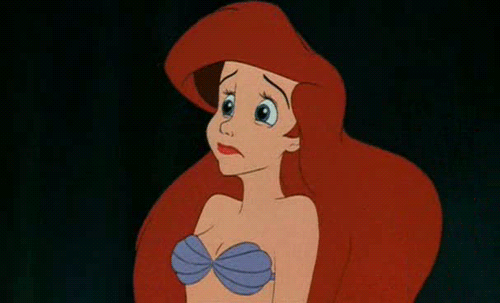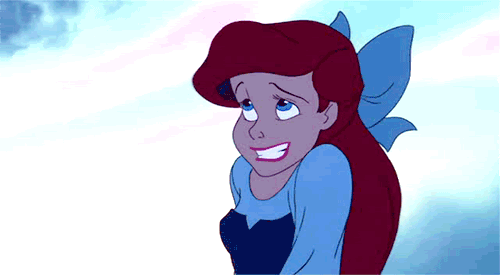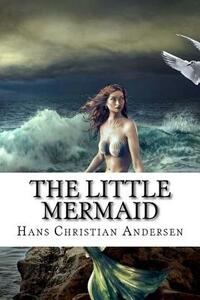Take a photo of a barcode or cover
I have always loved the little mermaid.
When I was young and I read the book for the first time, I remember being so disappointed that the mermaid (who was still Ariel to me) did not end up with the prince.
It is always nice to revisit stories from your childhood. Hans Christian Andersen, while often morbid tells great stories.
When I was young and I read the book for the first time, I remember being so disappointed that the mermaid (who was still Ariel to me) did not end up with the prince.
It is always nice to revisit stories from your childhood. Hans Christian Andersen, while often morbid tells great stories.
This was a beautiful classic fairytale filled with gorgeous illustrations. The story was sweet and magical and would be a great for all kids. I found it to be a nice and easy read for kids and think they would immensely enjoy this@
Actual rating: 3,5 stars
Classics are always difficult to review due to the differences between our mentalities and our society today compared to those of almost 200 years ago. It’s even more difficult when it’s a fairy tale whose only goal is to deliver a message and/or a moral without worrying too much about the logic of the overall plot and the more or less justified actions of the characters.
The edition I read contained several of Hans Christian Andersen’s fairy tales and I enjoyed reading many of them, but I must admit that not all have survived the passage of time. Reading these stories as an adult was also quite shocking as some of them are far from joyful and not all have a happy ending. Overall, I'm glad I read these children’s classics by Hans Christian Andersen and loved how certain morals were conveyed.
Classics are always difficult to review due to the differences between our mentalities and our society today compared to those of almost 200 years ago. It’s even more difficult when it’s a fairy tale whose only goal is to deliver a message and/or a moral without worrying too much about the logic of the overall plot and the more or less justified actions of the characters.
The edition I read contained several of Hans Christian Andersen’s fairy tales and I enjoyed reading many of them, but I must admit that not all have survived the passage of time. Reading these stories as an adult was also quite shocking as some of them are far from joyful and not all have a happy ending. Overall, I'm glad I read these children’s classics by Hans Christian Andersen and loved how certain morals were conveyed.
“Stories, after all, are what awaken mortals to the truth.”
I love the original tale, and this is a great little rendition. Its so well narrated, the sound effects are perfect and immersive, and the singing is beautiful. One of my fave audible creations!!
Also, I love the ending. So gorgeous.
I play it to help me go to sleep at night <3
I love the original tale, and this is a great little rendition. Its so well narrated, the sound effects are perfect and immersive, and the singing is beautiful. One of my fave audible creations!!
Also, I love the ending. So gorgeous.
I play it to help me go to sleep at night <3
Era da tempo che cercavo una versione illustrata della mia fiaba preferita, e finalmente ho trovato quella perfetta! Le illustrazioni di Santore sono incredibili, e le pose e i colori danno quell'atmosfera un po' malinconica che tanto si addice alla storia. Grazie bookdepository per avermi inviato uno sconto, l'ho sfruttato al meglio! XD
“I know what you want,” said the sea witch; “it is very stupid of you, but you shall have your way, and it will bring you to sorrow, my pretty princess. You want to get rid of your fish’s tail, and to have two supports instead of it, like human beings on earth, so that the young prince may fall in love with you, and that you may have an immortal soul.”
This dark but sad fairytale is definitely not the Disney version we grew up on. There's suffering, sacrifice, and maybe there's a happy ending of sorts but it's not easily won by gallant heroics.
When I was in school, I did a fun presentation for my class revealing the darker side of fairytales (it was a real hit and shocker too)... And I remember that the one that stuck with me most was Hans Christian Andersen's "the Little Mermaid". It was so sad but also so different from the Disney version in all the ways we don't want it to be. Anyway, I've recently picked out a dark retelling of the fairytale: [b:Drown: A Twisted Take on the Classic Fairy Tale|26115647|Drown A Twisted Take on the Classic Fairy Tale|Esther Dalseno|https://d.gr-assets.com/books/1439806372s/26115647.jpg|46062514] and decided to read the original first, since I never read the full version before.
It starts a little similar to the Disney version.
The Little Mermaid (no name mentioned) is the youngest of six mermaid princesses. She's always been curious about life above the sea, but she's not allowed to swim up to the surface until she turns fifteen. When she finally does, she looks in on a ship celebrating the sixteenth birthday of a handsome prince she finds instantly captivating. The ship is soon torn apart by a storm and she pulls the drowning prince to the safety of a beach. But then she has to hide because several girls walk out from a nearby church. And guess what? She watches him wake up and mistake one of the girls as his rescuer.
Later after watching him from a distance for a while, she has a talk with her grandmother. She learns that while mermaids live longer than humans, they don't have an immortal soul and simply dissolve into sea foam when they die and cease to exist - unless a human loves them enough to marry them and therefore share their soul with the mermaid.
So, she goes to the sea witch (who is ten times creepier than Ursula), and is promised legs, but what are the conditions. Let's list them:
--She not only loses her voice (her most defining feature), but gets her tongue literally chopped off. Yeah.
--the transformation from fins to legs will be as painful as being sliced in half.
--of course the pain doesn't end there. She'll walk gracefully but with every step it'll feel like stepping on sharp knives that cut her open. And this is supposed to be a Children's book?! *shivers*)
--if the Prince marries someone else, she will immediately turn into sea foam and nothingness.

It's an all or nothing deal. And maybe you can say she's completely stupid for agreeing but I just couldn't not sympathize with her. She's young, afraid of dying and being forgotten, and wants the love of someone who just happens to be the answer to her wishes.
And does all that pay off? The Prince takes her in to stay at his palace, but he is still fixated on the idea of the girl he saw on the beach - who he thinks saved him. He doesn't know who the mermaid really is, and all she's done for him, she can't sing to impress him - she can't say anything at all. So to get him to notice her, she dances for him (ouch ouch). After that, he does start to really like her.
But how does he show it?
He lets her sleep "at his door" (because that means she's special to him - like a Golden Retriever, maybe), he calls her "dumb" a lot - and I know he's not referring to her intelligence but to her disability but how is that better in any world and century? I don't know if it was an acceptable term back then but it's like he kept throwing it in her face and I wanted to smack him every time. He apparently loves her like a "child". Man, she's only a year younger than you! But then he has the gall to basically tell her that she's his consolation prize for not finding his actual savior. Later he tells her he'd choose her if forced to marry (because she looks like said-savior), calls her dumb again, and kisses her.

But what happens when it turns out this other princess he's being arranged to marry is the girl from the beach (the false rescuer)? Where does that leave the Little Mermaid?

Spoiler
He dumps her, of course.But that's not all of it... Does he let her down nicely? I'm sure he thinks he does when he demands she be happy for him:
"Oh, I am too happy,” said he to the little mermaid; “my fondest hopes are all fulfilled. You will rejoice at my happiness; for your devotion to me is great and sincere.”

How is any of this fair??
The Little Mermaid gets a chance to fix everything in the end. Her sisters tell her they've bargained with the witch for her to come back to the sea, and she's agreed with the instruction that the mermaid has to kill the Prince. But the mermaid doesn't do it. She jumps into the ocean instead, where she would die. She doesn't take the easy way out even though she's obviously terrified.
I know some will say the moral of the fairytale (they all have those) is probably to be satisfied with what you already have, to be careful what you wish for.... Okay, sure, that's all fine. But the Little Mermaid is not whiny or selfish or greedy at all.
She's determined, suffering in literal silence, taking on the worst obstacles and in the end she'd rather lose it all than be selfish or vicious. She wasn't only pining for a boy, she wanted so much more for herself, but she doesn't sacrifice anyone but herself to get it. And that's why there's a pretty appropriate twist to the ending of her story.
Spoiler
Her struggles are noticed by spirits/beings called the 'Daughters of the Air' who live to do good in order to earn an immortal soul. They let her join them instead of fading away, and she lives on - with no pain.I remember that while I was researching this years ago, I read that in the original ending the mermaid simply jumps into the water, fading into sea foam forever. I'm not sure about this info, but that ending would have really been depressing and pointless.
This Mermaid's happily ever after is not exactly like Ariel's but it's more in line with her own hopes and struggles. In some ways I liked her a little more than Ariel because she was really and truly challenged because of her choices.
I like the story as it is, written when it was. But if I ever have children, I'd let them see the Disney version instead. I'd choose for them the version without the princess dancing on knives for the prince when he's not even worth a paper-cut. A version with no knife-stepping at all is good enough! :D
And that, folks, is why you never rest your wellbeing on a man.
Disclaimer: ARC via Netgalley.
“The Little Mermaid” is, perhaps, one of Anderson’s most well-known tales, though most people I would wager, do not know the source material and cling to the Disney version. The duo of Metaphrog does not do Disney.
Which is a good thing.
Anderson’s tale left me conflicted when I re-read it as an adult, leaves me conflicted whenever I read it know. It isn’t the stepping on knives bit; it’s how the prince treats the mermaid. She sleeps at the foot of his bed, he pets her, she is his dog – faithful to the end. But in fairness to the prince, it isn’t that the mermaid wants him; she really wants a soul. He is a way to gain a story. The whole relationship is strange, yet the mermaid succeeds to a degree because she has more of the “Christian virtues” that the prince should have.
In some ways, this excellent adaption of the story shies away from those issues. The Little Mermaid here is in love with the prince (and perhaps legs). The adaption’s ending is faithful to the choice that Anderson’s character makes. Yet, the image is subtly different for the choice occurs before the wedding. Despite the use of legs, including slit dresses, Metaphrog seem to have tamped down the sexual elements of the story as well as the idea of a soul -the term immortal is used instead, which means the original mermaid might not have had a problem with that.
Those issues aside there is much to love in this. The artwork – blues and greens – is wonderful. The paneling of the story is great. There are people of color, though the two central characters are white. The Sea Witch is not an Ursula type and comes across as a helper.
“The Little Mermaid” is, perhaps, one of Anderson’s most well-known tales, though most people I would wager, do not know the source material and cling to the Disney version. The duo of Metaphrog does not do Disney.
Which is a good thing.
Anderson’s tale left me conflicted when I re-read it as an adult, leaves me conflicted whenever I read it know. It isn’t the stepping on knives bit; it’s how the prince treats the mermaid. She sleeps at the foot of his bed, he pets her, she is his dog – faithful to the end. But in fairness to the prince, it isn’t that the mermaid wants him; she really wants a soul. He is a way to gain a story. The whole relationship is strange, yet the mermaid succeeds to a degree because she has more of the “Christian virtues” that the prince should have.
In some ways, this excellent adaption of the story shies away from those issues. The Little Mermaid here is in love with the prince (and perhaps legs). The adaption’s ending is faithful to the choice that Anderson’s character makes. Yet, the image is subtly different for the choice occurs before the wedding. Despite the use of legs, including slit dresses, Metaphrog seem to have tamped down the sexual elements of the story as well as the idea of a soul -the term immortal is used instead, which means the original mermaid might not have had a problem with that.
Those issues aside there is much to love in this. The artwork – blues and greens – is wonderful. The paneling of the story is great. There are people of color, though the two central characters are white. The Sea Witch is not an Ursula type and comes across as a helper.



